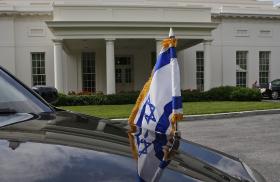Even as the historic signing of the Israel-PLO Declaration of Principles on September 13, 1993 has raised hopes for an end to conflict, it has also created new challenges and opportunities for actually implementing peace in the Middle East.
All the parties acknowledge that the political success of the peace process is inextricably linked to delivering the dividends of peace to the people of the region. The beneficial results on the ground that will guarantee peace are achievable through intraregional economic cooperation in the form of joint investment projects, open markets, and an end to boycotts. Progress on this level will help build strategic partnerships among Middle Eastern governments, foster peaceful relations among businesses and people living in the region, and encourage others to join the peace train.
These developments carve out an important role for the United States in implementing and broadening peace in the Middle East -- to encourage regional trade and economic development, as well as investment and assistance from the international community, to try and minimize risks, and help shape opportunities.
In order to examine the concrete realities and possibilities of building the economics of peace, The Washington Institute devoted a session of its annual policy conference of October 15-17, 1993 to this topic. At the conference, entrepreneurs from Israel, Egypt, and Turkey, who are actively engaged in joint business projects in the region, offered their insight and vision. Their presentations and the accompanying documents outline a variety of approaches for business endeavors in the region, and provide a guide to the opportunities, problems, and challenges that lie ahead.



